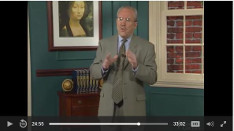The Foundations of Western Civilization course, offered by The Great Courses Plus, can be the core resource for a one-semester-long high school world history course. It consists of 48 video lectures running about 30 minutes each along with two short-essay questions for students to answer after each lecture.
The course’s 293-page guidebook, a downloadable PDF file, is essentially the script for the lectures, although there are minor changes or omissions in the guidebook. There are maps and a glossary at the back of the guidebook along with an extensive bibliography.
The guidebook should be very helpful if students need to go back to the course information as they answer questions. There is no answer key and there are no exams.
I envision students spending no more than two days per lecture watching the video and writing their answers to the questions. Since students should be dedicating about 60 hours to earn a half credit, some students will need to invest time in supplemental reading or other work to gain enough hours. You might consider having them tackle an in-depth research paper which would require sufficient hours while also providing something besides the questions for evaluation purposes.
The presenter for this course is Professor Thomas F. X. Noble, a teacher at the University of Notre Dame. It seems almost certain from his language and familiarity with Catholicism, that he is Catholic himself. His presentation is somewhat classical in its outlook and treatment of ideas which isn’t surprising in a course that is about Western civilization.”
What makes this course especially good is that Noble makes connections between events, movements, philosophies, religions, culture, and technological advances that have shaped Western civilization. He discusses underlying ideas, competing ideologies, and influences from both antiquity and religion. Particular emphasis is placed on the roots of Western civilization in both the classical and Judeo-Christian worlds.
His treatment of religious topics might work for anyone who wants the inclusion of religion (particularly Christianity) without either Catholicism or Protestantism being advanced. Professor Noble avoids polemics, instead providing a balanced treatment of Catholicism and Protestantism, especially in his treatment of the Reformation era. The only exception might be his somewhat dismal view of Calvin’s teachings, although this is a very minor point in the course. Also, some Christians might take issue with what seems a liberal understanding of the Bible as he discusses the Old Testament. Even though the courses at The Great Courses Plus are supposed to be suitable for a broad audience that is largely secular, this course is likely to have much greater appeal for Christians than for a secular audience because of its extensive coverage of religious events.
The course covers up through around 1600 A.D., a point at which point Professor Noble says the “essential traditions of the western tradition have anchored themselves.” He lists those traditions as the Renaissance, the Reformation, a divided Christendom, interlocking political power relationships, and the scientific revolution.
This is a lecture-based course, probably very much like courses Professor Noble teaches in the classroom. It is filmed with at least two cameras, and Professor Noble moves around as he teaches. He occasionally inserts visuals, but not often. The content is very interesting even though the presentation is not exciting.
The course is available for purchase in either audio or video format or through a Wondrium subscription.









